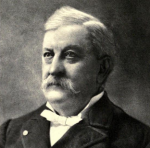
The history of a state as well as that of a nation is chiefly a chronicle of the lives and deeds of those who have conferred honor and dignity upon society. The world judges the character of a community by those of its representative citizens, and yields its tributes of admiration and respect for the genius or learning or virtues of those whose works and actions constitute the record of a state’s prosperity and pride. Among the distinguished citizens of Idaho is Judge Joseph Waldo Huston, of Boise, who holds distinctive precedence as an eminent lawyer and jurist, as a statesman, as a man of high scientific and literary attainments, a valiant and patriotic soldier and as one who occupied a most unique and trying position in an important epoch in our judicial history, in which connection he bore himself with such signal dignity and honor as to gain the respect of all.
Judge Huston was born in Painesville, Ohio, April 10, 1833. On the paternal side his ancestors were from County Tyrone, Ireland, and were early settlers in the state of New Hampshire. The military record is one of which the family has every reason to be proud. The grandfather of the Judge valiantly aided in the struggle for independence, and his father, Caleb C. Huston, defended the new republic in the second war with England, after which he emigrated to Ohio at an early day. There he married Pamelia Hall, whose people were also early settlers of New York and northern Ohio. By this marriage were born seven sons and a daughter. Four of the sons loyally served their country in defense of the Union during the Civil war, and one of the number was killed at the battle of Perryville, Kentucky.
Judge Huston was educated in Kalamazoo, Michigan, studied law under the direction of ex-Senator Stuart, was admitted to the bar in 1857, and soon afterward removed to Paw Paw, Michigan, where he engaged in the practice of his chosen profession until April. 1861. In the meantime he had been closely studying the questions arising out of the slavery conditions of the south, and when war seemed imminent, had resolved to defend the Union if the call was issued for volunteers. Accordingly, when Fort Sumter was fired upon and President Lincoln asked for the aid of loyal men in crushing out the rebellion in its infancy. Judge Huston went to the front as a member of the Fourth Michigan Cavalry. He assisted in the organization of the regiment, was promoted to the rank of first lieutenant and afterward to major. He served with distinction until 1863, when, on account of physical disability, he was mustered out of the service. His bravery, however, was made manifest on southern battlefields, and with an honorable military record he returned home.
As soon as he had sufficiently recovered. Judge Huston resumed the practice of law, and in 1869 was appointed by President Grant to the position of United States attorney for Idaho. He at once came to this state, and for nine years, until 1878, filled that position in a most satisfactory and acceptable manner. He then resumed the private practice of law, which he continued until 1890, when he was elected to the supreme bench of the state. In 1894 he was re-elected for a term of six years. This office he fills with the utmost fidelity and fairness. Some of his decisions rank among the classics of judicial literature and are characterized by great clearness of thought and originality of illustration. His decision in the case of the state versus Reed elicited much favorable comment. He laid great emphasis upon the fact, frequently overlooked by jurists, that the object of criminal courts was to punish criminals, not to furnish them means of escaping punishment. The Portland Oregonian published a large part of the decision, and had an editorial on the subject under the caption, “A Decision Long Due,” in which the decision was highly commended, especially because it came from one of the younger state supreme courts.
Judge Huston has been a lifelong Republican, but differs from his Party on the money question, having long been an ardent bimetallist. He was a delegate to the silver convention held in Helena, Montana, in 1892, was a delegate to the American Bimetallist League in 1893, and for several years has been vice president of the latter organization. In 1896 he supported Mr. Bryan for the presidency with great ability and zeal. He is a man of scholarly attainments and broad literary culture, possesses a very fine library and is a thorough Shakespearean student.
In 1855 Judge Huston was happily married to Miss Lucia Wilder, of Kalamazoo, who departed this life in 1863, leaving a daughter, who is now Mrs. Carrie Leonard, of Boise. In 1864 he married Miss Frances Collister, of Willoughby, Ohio, and for thirty-four years they have now traveled life’s journey together. They have a son, Collister P., a graduate of the Hahnemann Medical College, of San Francisco, and now with the First Idaho Volunteers, having enlisted for service in the Spanish-American war. The Judge has a very pleasant home in Boise, the center of a cultured society circle, and there hospitality reigns supreme.
He is largely interested in mining in Washington County, Idaho, but the practice of law has been his real life work, and at the bar and on the bench he has won marked distinction. A man of unimpeachable character, of unusual intellectual endowments, with a thorough understanding of the law, patience, urbanity and industry, Judge Huston took to the bench the very highest qualifications for this most responsible office of the state government; and his record as a judge was in harmony with his record as a man and a lawyer, distinguished by unswerving integrity and a masterful grasp of every problem that presented itself for solution.
